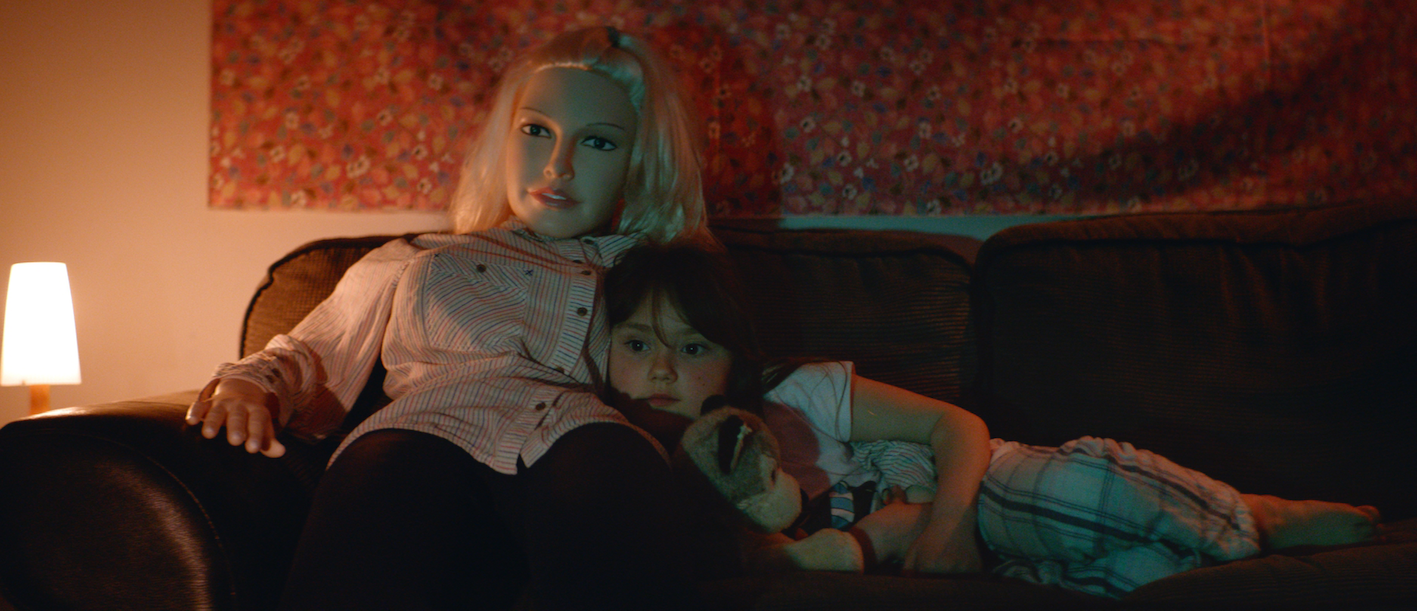Established and thriving live-action director Meriem Adib has created sophisticated spots for many famous faces including Idris Elba, Bear Grylls, and James Cracknell. Despite this, there’s one spot that stands out amongst her sea of others.
In 2016, Meriem unveiled her propelling masterpiece entitled ‘Mum’ focusing on the societal issues that sex workers face. Her metaphorical use of a doll in the role of a mother working in this field spoke volumes to many and this received an overwhelming response from both the public and on-screen personalities.
NERD want to shine a light back onto the importance of the message of ‘Mum’ and who better to tell us more about it than the woman who wrote and directed it herself?

But first, tell us a bit about you…
We want to know about your earlier years… where did you grow up?
MA> I grew up in London, arriving as a baby from Algeria. My father is Algerian and my mother is French. I spent my early childhood in Kensington which sounds very posh but actually, it’s where all the French-speaking people congregated and it wasn’t as exclusive as it is now. Our first family home was a cockroach-infested flat that Orson Wells had lived in. My mother kept getting calls asking for him. I remember being sat in my pushchair on the pavement facing the road, I must have been around 3, wondering what we were doing in this grey, wet and noisy place. But it soon became home and I love London with unbridled passion. I am a Londoner above all else. Sometimes a very frustrated one but always a Londoner.
What sparked your interest in film at such a young age? Was it early on that you realised that directing could become your life and your living?
MA> I love stories and story-telling, always have. It’s not a conscious love, it’s just part of my DNA. I have a very vivid imagination. I come up with about 10 ideas a day, narratives and concepts, so it’s what comes naturally to me and what I love!
What inspires you, motivates you or captivates you during a piece of work?
MA> A very difficult question. In one word, truth. Whether it’s as a viewer or as a maker, the piece has to resonate with me. Whatever I do, I have to see that authenticity in their eyes. I spend a lot of time thinking ‘so what’ and when I work as a Creative Director I ask my team that question – why should I care, give me a reason, give me a hook. You have to respect your audience and yourself – give them a reason to keep watching, a payoff, be it emotional, visual or intellectual and to an extent, ideally all of those! On a personal level, I absolutely have to put together a fantastic team, a healthy atmosphere of cooperation, married with great leadership and vision, always translates brilliantly on screen.
Now tell us about ‘Mum’…
How did the idea of making the short film ‘Mum’ come about, what inspired it?
MA> Well I believe that if you are going to make something it should matter. I wanted to tell a powerful story centred around motherhood that was seen through the eyes of a child. Motherhood is not portrayed much in film, and if it is it doesn’t resonate much with me. I’m a single parent and with that comes a trailer load of experiences, challenges and wonders. At that time I was under a lot of pressure – being a one-income family can be pretty testing for the huge majority of us. Add to this my realisation, from reading an Amnesty International article in support of decriminalising sex work and the reasons why, well, my mind went into overdrive.
I saw an opportunity to tell a story that mattered and that was not told enough. That as a film-maker was a wonderful task I set myself – to challenge stereotypes of sex workers who are mothers and share the information that I had learned and that had made me rethink the whole issue. Astonishingly, at least 70 % of sex workers are mothers and decriminalisation is the only safe way forward for these women. I thought about the implications of that, about how vulnerable sex workers are, about the reasons why most sex workers work in that industry and I felt it was a hugely important issue that needed to be amplified. I could lend my voice to the cause to decriminalise sex work and portray the issues facing the workers, who are just like you and me trying to make a living with the cards we have been dealt.

What made you decide that you would both write and direct the film?
MA> Hahaha. Good question. Well, I am a writer and director. I have been a senior writer on a number of award-winning campaigns as well as an award-winning director – so as this was from the heart and very personal, I just had to write it, a little jewel I am very proud of.
What gave you the idea of using dolls to represent the mother and why did you choose this?
MA> It’s the agency creative in me. I wanted to shock, but for a good reason. I am outraged by our objectification and dehumanisation of women and sex workers – so let’s make that point by reflecting it back to the audience. The end of the film gives this choice meaning.
How long did the film take you to create?
MA> From conception to going live, about 6 months. A lot of thoughts and hard work from some wonderful people went into it. I can’t stress the contribution of the English Collective of Prostitutes and Claire (the producer) enough. A joint effort and of course the passion of everyone who got behind it. It mattered.

Was there any point throughout the construction period that you found difficult, creatively or emotionally?
MA> Yes! So many points. It’s pretty distressing hearing some of the real stories and experiences of women who work as sex workers under current law. No one listens enough. They are made to be so vulnerable. Hearing them talk about their hardship was emotional. But really, it’s not about me. As I say, it was a privilege and it was important that I help amplify their cause. Their cause is our cause.
On a practical level, working full time, raising a child on your own and trying to get a short off the ground, a political short and a social media campaign around it, is no easy task. It was tiring but inspiring, but it was teamwork that got it done.
How was it decided that this would be launched in Parliament?
MA> That was the ECP’s idea. Claire and I knew we needed to make some noise. Some great people got behind it – actors such as Michael Sheen, Sarah Sulimani, Stephanie Beacham, Indira Varma got behind it and others like Jo Brand promoted it on social media – we had to make a bit of a splash. It was important that the ‘venue’ stood out. And given that we are supporting the ECP and their call for a change in the law, we needed to show the film and the campaign somewhere politicians would see it. We got some great support, from Tulip Siddiq and Dawn Porter to Lord Alfred Dubbs. Those corridors of power belong to us as well as the political establishment – that was our attitude. It was very important that we hear the case for decriminalisation from a fresh perspective – so we had sex workers there opening up, some in disguise, about their lives as working mothers, and the terrible dangers they have been subjected to. We needed the right environment for that.

What is the biggest misconception about sex workers?
MA> People focus on the small minority that are drug users. Most are not, no more than any other ‘low-skilled’ industry. People also imagine that a huge number are trafficked. The statistics regarding actually uncovering and helping victims of trafficking in this way are miniscule. The best way to end sex trafficking? End trafficking full stop, focus on that and thankfully there are already laws for that. And who can help us root out the traffickers and point us to the victims of trafficking the most effectively? Sex workers. Sex workers organisations are very active in doing so. Decriminalisation would help uncover trafficking far more effectively than current law.
The other myth is that most sex workers are childless… The majority are mothers. The ECP are active feminists, they are not promoting sex work as a great option for women, they have a deep and intelligent approach to the issue. Their point is; sex work exists, it will always exist in society as it is, so we need to make it safer for the workers and not penalise them because we don’t approve. And meanwhile, we need to all pull together and improve the economic opportunities for all woman and mothers.
Any final thoughts?
MA> Since austerity the number of women who have turned to sex work to survive has rocketed – 60% in Doncaster. The fact that the police can and do arrest them means that they are extremely reluctant to report any crime they suffer, it also means that they are slapped with huge fines – and how are they going to pay them off? It forces them back into sex work. To add to that, they get a criminal record which means they can’t get a ‘normal’ job and then their opportunities are crushed. It’s a joke, and outrage really. Austerity is felt the hardest by women and the poor and yet they are the people we punish the hardest. There is a lot more I could say about it but I would just urge people to question everything they think they know about sex work and go to the ECP’s information site and find out what it’s really like.
Want to see more of Meriem’s work? Click here.
Want to work with Meriem or one of our other NERDs? Click here.

